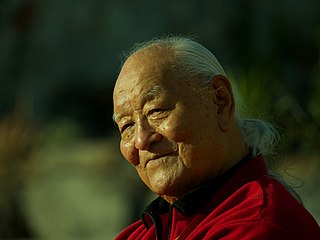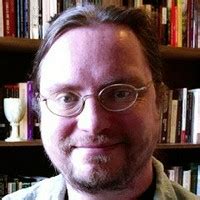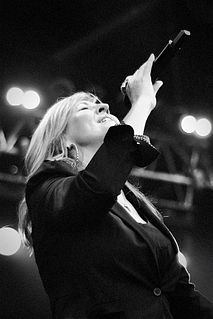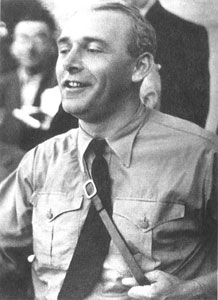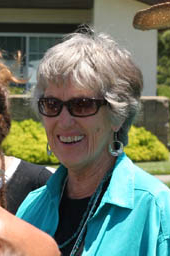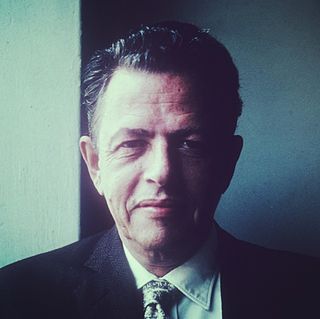A Quote by Hannah Arendt
... the loss of belief in future states is politically, though certainly not spiritually, the most significant distinction betweenour present period and the centuries before. And this loss is definite. For no matter how religious our world may turn again, or how much authentic faith still exists in it, or how deeply our moral values may be rooted in our religious systems, the fear of hell is no longer among the motives which would prevent or stimulate the actions of a majority.
Quote Topics
Actions
Again
Among
Authentic
Before
Belief
Centuries
Certainly
Deeply
Definite
Distinction
Exists
Faith
Fear
Future
Hell
Hell Is
His Loss
How
How Much
Longer
Loss
Majority
Matter
May
Moral
Moral Values
Most
Motives
Much
Our
Our World
Period
Politically
Present
Prevent
Religious
Rooted
Significant
Spiritually
States
Still
Stimulate
Systems
Though
Turn
Values
Which
World
Would
Related Quotes
Duality is the real root of our suffering and of all our conflicts. All our concepts and beliefs, no matter how profound they may seem, are like nets which trap us in dualism. When we discover our limits we have to try to overcome them, untying ourselves from whatever type of religious, political, or social conviction may contain us. We have to abandon such concepts as 'enlightenment', 'the nature of the mind', and so on, until we no longer neglect to integrate our knowledge with our actual existence.
In college, in the early 1950s, I began to learn a little about how science works, the secrets of its great success, how rigorous the standards of evidence must be if we are really to know something is true, how many false starts and dead ends have plagued human thinking, how our biases can colour our interpretation of evidence, and how often belief systems widely held and supported by the political, religious and academic hierarchies turn out to be not just slightly in error, but grotesquely wrong.
It is taboo in our society to criticize a persons religious faith... these taboos are offensive, deeply unreasonable, but worse than that, they are getting people killed. This is really my concern. My concern is that our religions, the diversity of our religious doctrines, is going to get us killed. I'm worried that our religious discourse- our religious beliefs are ultimately incompatible with civilization.
God is okay. He's got big shoulders. He's okay with our - with our questioning and our - you know, I think the bigger the question, the bigger the answer, you know? It may be sickness, it may be loss, it may be disappointment, but sometimes you feel like heaven's silent, that "God, how-how can this be love?" But actually, if you go back to the Word, you know, it just underpins everything.
Religion and race belong together. German man can only assimilate religious faith and religious thought with a German mind and in a German way. We must not think we can come to God except through our Volk....Wherever our blood rises in protest we act immorally, even though others may try to prove it to be moral.
The feeling of righteousness is the core mood alteration among religious addicts. Religious addiction is a massive problem in our society. It may be the most pernicious of all addictions because it’s so hard for a person to break his delusion and denial. How can anything be wrong with loving God and giving your life for good works and service to mankind?
Out of this darkness a new world can arise, not to be constructed by our minds so much as to emerge from our dreams. Even though we cannot see clearly how it's going to turn out, we are still called to let the future into our imagination. We will never be able to build what we have not first cherished in our hearts.
But we were born of risen apes, not fallen angels, and the apes were armed killers besides. And so what shall we wonder at? Our murders and massacres and missiles, and our irreconcilable regiments? Or our treaties whatever they may be worth; our symphonies however seldom they may be played; our peaceful acres, however frequently they may be converted into battlefields; our dreams however rarely they may be accomplished. The miracle of man is not how far he has sunk but how magnificently he has risen. We are known among the stars by our poems, not our corpses.
I believe not only that religious faith will be victorious, but that it is vital to humankind that it shall be. We may differ in form and particulars in our religious faith. Those are matters that are sacred to each of our inner sanctuaries. It is our privilege to decline to argue them. Their real demonstration is the lives that we live.
Man can only be certain about the present moment. But is that quite true either? Can he really know the present? Is he in a position to make any judgment about it? Certainly not. For how can a person with no knowledge of the future understand the meaning of the present? If we do not know what future the present is leading us toward, how can we say whether this present is good or bad, whether it deserves our concurrence, or our suspicion, or our hatred?
Our ego ideal is precious to us because it repairs a loss of our earlier childhood, the loss of our image of self as perfect and whole, the loss of a major portion of our infantile, limitless, ain't-I-wonderful narcissism which we had to give up in the face of compelling reality. Modified and reshaped into ethical goals and moral standards and a vision of what at our finest we might be, our dream of perfection lives on--our lost narcissism lives on--in our ego ideal.
At times it may seem worse - harder, at least - to live through the despair of this loss without the temporary comfort of our addictive behaviour. We cannot drown our sorrows. We must face the fact that we don’t know, really, where we are, how we got here, how long the pain will last, or how to move past it. That uncertainty may be the most painful part of not knowing a God: no one is there to reassure us that a God will take the pain and confusion away. We simply don’t know. And we have no way to numb ourselves or to forget the condition we’re in.


